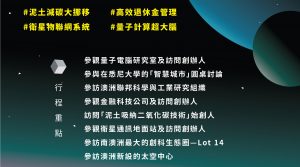Between Oct 6-10, twelve local tertiary students drawn from The Chinese University of Hong Kong, The Polytechnic University of Hong Kong, The Hong Kong University of Science and Technology, and The University of Hong Kong embarked on an experiential education and exchange program to Australia underwritten by the Foundation. They visited Sydney and Adelaide to gain first-hand local knowledge regarding technology start-ups in satellite technology, microbial biotechnology, quantum computing, 10 financial technology organised by The Commonwealth Scientific and Industrial Research Organisation which is Australia’s national science research agency.
The delegation learned that Australia has a population of 25 million, but it has pioneered many innovations that have advanced civilization and improved lives, including the key technology for Wi-Fi in 1993. At the time the Australian Government did not have the proper policies in place to support its technology industries. It was only through litigation later that the Government was able to receive the patent payments. These lost opportunities made the Government realise that successful commercialization of technology and inventions requires comprehensive patent protection and policy support. Today, the CSIRO alone owns over 4,000 patents, with 100 new ones added each year.
The start-ups visited by the students are all focused on problem-solving today’s grand challenges. Fleet Space Technologies is building the global digital neural network to connect billions of sensors and devices simply and cheaply; SoilCQuest’s mission is to provide simple method to use technology for the world’s farmers to mitigate climate change while improving the productivity of their soils; Spaceship is a financial services company offering investment and superannuation products, specifically designed to engage younger people; Q-CTRL focuses on control techniques that help teams extract useful performance from quantum hardware to improve the performance of quantum sensors in realistic environments.
The Foundation has continually invested in the future of our youth in Hong Kong. In August 2019, six local secondary students who won an award for a Saildrone design went to San Francisco to visit the Saildrone headquarters as well as other start-ups in the Bay Area, including a synthetic biology manufacturing facility which produces plant-based meat. The Foundation believes through experiencing how different countries address our shared global challenges with innovative solutions may open the eyes of our students to the impact of technological entrepreneurship and help them unleash their own potential to contribute to this ecosystem. Collectively we can all make a difference and move forward in step with all the positive changes to bring Hong Kong into this exciting future.
The 12 students were selected by the four participating universities, who come from different disciplines such as maths, philosophy, integrated systems and design, law, finance, product design, and engineering, etc. The delegation consisted of 30 people, including members of the media and tour chaperons.
Excursions to Europe and the East Coast of the US will follow soon.
Mr. Li Ka-shing, Chairman of the Foundation, said, “A deep-dive into some of humanity’s most pressing issues with an open and humble mind paves the way for not only greater understanding but more importantly, more innovative solutions.” Mr. Li believes that Hong Kong people have the DNA for creativity, and young people should reserve their place in the future by equipping themselves with the requisite knowledge in the current global technology wave.
About the Li Ka Shing Foundation
The Li Ka Shing Foundation was established in 1980 to work on education, medical services and research initiatives. To date, Mr Li has invested over HK$25 billion across 27 countries and regions, with about 80% of the projects within the Greater China region. In 2006, Mr Li described his philanthropic effort as akin to having another son in the family. He called for a paradigm shift in our Asian culture of giving, through apportioning more of our wealth and means towards social capital so that we could bring forth great hope and promises for the future.


